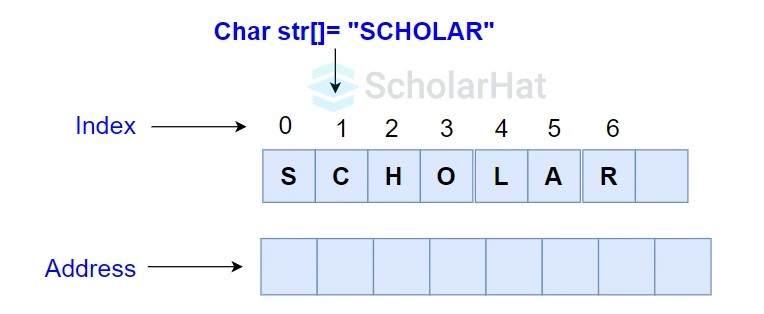30
JanC# String
C# string is a sequence of characters used to represent text. They are immutable and are defined by using the keyword string, which is an alias for System.String class commonly used in applications that involve text processing, user input, file I/O, and data formatting. Understanding string immutability, memory management, and built-in methods is crucial for writing efficient, secure, and high-performance applications.
In this C# tutorial, I'll break down the key concepts of working with strings, common methods for string manipulation, and why mastering them is essential for building high-performing, reliable applications. C# powers 40% of enterprise applications. Stay competitive—join our Free C Sharp Course today!
What is the C# string?
Strings in C# are a fundamental part of any application, playing a vital role in storing, handling, and manipulating text data. Whether you’re building a console app, a web application, or an enterprise system, working with strings is essential for tasks like user input, logging, file processing, and displaying messages.

- In C#, a string is a data type that stores character sequences such as words or sentences.
- It is immutable, which means that once produced, the string's value cannot be modified, and any modification causes a new string to be formed.
- Strings are often used to handle text and may be readily modified with the.NET framework's built-in functions.
Why Strings in C# Matters?
Mastering strings in C# will help you with the following:-
- Write clean and efficient code.
- Avoid memory and performance issues related to excessive string operations.
- Understand key concepts like immutability, garbage collection, and reference behavior.
- Build applications that handle text input/output in a global, scalable, and secure way.
Key Characteristics of Strings
Here are the key characteristics of strings in C#:
1. Immutable
- Strings cannot be changed after creation. Modifying a string creates a new one.
2. Reference Type
- Strings are objects (reference types) from the System.String class and stored in the heap.
3. Supports Indexing
- You can access individual characters using index notation (str[0]).
4. Concatenation & Interpolation
- Strings can be combined using +, +=, or $"Hello {name}" for interpolation.
5. Case-Sensitive Comparison
- String comparisons are case-sensitive by default ("Hello" != "hello").
6. Built-in Methods
- C# provides useful methods like .Length, .ToUpper(), .Substring(), etc.
Example of Strings in C#
using System;
class Program
{
static void Main()
{
string message = "Hello, World!";
Console.WriteLine(message);
}
}
Output :
Hello, World!
Explanation:
string message = "Hello, World!";- A string variable named message is declared and initialized.
- Console.WriteLine(message); → Prints the string to the console. This is the most basic way to declare and use a string in C#.
Real-world Analogy
Explanation
- The original string is like a book page.
- Modifying the string creates a whole new page, just as modifications to a C# string create a new string.
String vs. System.String
In C#, string is an alias for System.String. They are functionally the same, but understanding this distinction can help clarify the language's syntax and structure.
| Feature | string | System.String |
| Type | C# keyword(alias) | .Net class in System namespace |
| Usage | Common in C# code (string name) | Fully qualified name (System.Stringname;) |
| Example | string name = "Hello, World!"; | System.String name = "Hello, World!"; |
| Preferred for | Simplicity and readability | When using reflection or full namespace |
Immutability of String Objects
- Strings in C# are immutable, meaning that once a string object is created, it cannot be altered.
- This feature has implications for memory management and performance.
- When you manipulate strings, a new string object is created instead of modifying the original.
Properties of the String Class
The String class has several key properties :
Creating a String Object
Methods of Creating Strings
| Method | Description | Example |
| From a Literal | Define a string directly using double quotes. | string str = "Hello World"; |
| Using Concatenation | Combine multiple strings using the + operator. | string fullName = "FirstName" + " LastName"; |
| Using Constructor | Create a string from a character array using new string(). | char[] chars = { 'H', 'i' }; string str = new string(chars); |
| Using Property or Method | Use a property or call a method that returns a string. | string date = DateTime.Now.ToString(); |
| Using String Formatting | Use interpolation or String.Format() to construct strings | string msg = $"Hello, {name}"; String.Format("Age: {0}", age); |
Create a string from a literal
This is the most common way to create a string. You define a string variable and assign the value within double quotes. You can use any type of characters within double quotes except some special characters like a backslash (\).
Example: To illustrate the string creation using literals
// C# program to demonstrate the
// string creation using literals
using System;
class Program {
static void Main(string[] args) {
string str1 = "Hello, World!";
Console.WriteLine(str1);
// Using double slash to escape
string str2 = "C:\\Users\\Amit\\Documents\\file.txt";
Console.WriteLine(str2);
}
}
Output
Hello, World!
C:\Users\Amit\Documents\file.txt
Explanation
- This C# program shows how to build strings from literals.The str1 variable contains the basic string "Hello, World!" which is printed directly.
- The str2 variable demonstrates the usage of escape sequences (double backslashes \\) to indicate a file path, ensuring that special characters such as backslashes are appropriately handled.
Create a string using concatenation
You can create a string by using the string concatenation operator + in C#. This operator combines one or more strings.
Example: To illustrate the use of the string concatenation operator
// C# program to demonstrate the use of
// the string concatenation operator
using System;
class Program {
public static void Main() {
string firstName = "Amit";
string lastName = "Kumar";
// Using concatenation operator
string fullName = firstName + " " + lastName;
Console.WriteLine(fullName);
}
}
Output
Amit Kumar
Explanation
- This C# program explains the string concatenation operator (+).
- It combines two string variables, firstName and lastName, with a space between them to form a full name, which is then written to the console as "Amit Kumar".
Create a string using a constructor
The String class has several overloaded constructors that take an array of characters or bytes. You can create a string from a character array.
Example: To illustrate the creation of a string using the constructor
// C# program to demonstrate the creation
// of string using the constructor
using System;
class Program {
public static void Main() {
char[] chars = { 'A', 'M', 'I', 'T' };
// Create a string from a character array.
string str1 = new string(chars);
Console.WriteLine(str1);
}
}
Output
AMIT
Explanation
- This C# programshows how to create a string using the String constructor.
- It generates a string from a character array of chars that contains individual characters ('A', 'M', 'I', and 'T').
- The resulting string, "AMIT," is then displayed on the console.
Create a string using a property or a method
You can create a string by retrieving a property or calling a method that returns a string. For example, using methods of the String class to extract a substring from a larger string.
Example: To illustrate the creation of a string using a property or a method
// C# program to extract a substring from a larger
// string using methods of the String class
using System;
class Program {
public static void Main() {
string sentence = "Amit Kumar Singh";
// Extracting a substring
string firstName = sentence.Substring(0, 4);
Console.WriteLine(firstName);
}
}
Output
Amit
Explanation
- This C# program shows how to extract a substring from a bigger string by calling the String class's Substring function.
- In this example, the program extracts the first four characters ("Amit") of the text "Amit Kumar Singh" and displays the result on the console.
Create a string using formatting
The String.Format method is used to convert values or objects to their string representation. You can also use string interpolation to create strings.
Example: To illustrate the creation of a string using the format method
// C# program to demonstrate the creation of string using format method
using System;
class Program {
public static void Main() {
int age = 25;
string name = "Amit";
// String creation using string.Format method
string str = string.Format("{0} is {1} years old.", name, age);
Console.WriteLine(str);
}
}
Output
Amit is 25 years old.
Explanation
- This C# programexplains the use of a string.
- The Format method generates a formatted string.
- In this example, the computer inserts the values of the variable's name and age into a sentence, yielding the output "Amit is 25 years old."]
- This demonstrates how to dynamically format strings based on variable values.
Common String Methods
Length of a String
- You can find the length of a string using the Length property.
Join Two Strings
- Use the String.Concat or String.Join methods to concatenate strings.
Compare Two Strings
- You can compare two strings using the String.Compare method.
Contains
- Check if a substring exists within a string using the Contains method.
Getting a Substring
- Use the Substring method to extract a part of a string.
String Escape Sequences
- Special characters can be included in strings using escape sequences. For example, use \" for quotes and \\ for a backslash.
String Interpolation
- String interpolation allows you to embed expressions within string literals, making it easier to format strings.
Common String Methods in C#
Example
using System;
class Program {
public static void Main() {
// Creating strings
string firstName = "Amit";
string lastName = "Kumar";
// 1. Length of a String
int length = firstName.Length;
Console.WriteLine($"Length of '{firstName}': {length}"); // Output: Length of 'Amit': 4
// 2. Join Two Strings
string fullName = String.Concat(firstName, " ", lastName);
Console.WriteLine($"Full Name: {fullName}"); // Output: Full Name: Amit Kumar
// 3. Compare Two Strings
int comparisonResult = String.Compare(firstName, lastName);
Console.WriteLine($"Comparison Result (firstName vs lastName): {comparisonResult}"); // Output: Negative, since 'Amit' is less than 'Kumar'
// 4. Contains
bool contains = fullName.Contains("Amit");
Console.WriteLine($"Does fullName contain 'Amit'? {contains}"); // Output: True
// 5. Getting a Substring
string subString = fullName.Substring(0, 4);
Console.WriteLine($"Substring of fullName (first 4 chars): {subString}"); // Output: Substring of fullName (first 4 chars): Amit
// 6. String Escape Sequences
string filePath = "C:\\Users\\Amit\\Documents\\file.txt";
Console.WriteLine($"File Path: {filePath}"); // Output: File Path: C:\Users\Amit\Documents\file.txt
// 7. String Interpolation
string greeting = $"Hello, {firstName} {lastName}!";
Console.WriteLine(greeting); // Output: Hello, Amit Kumar!
// 8. Immutability of String Objects
firstName = "Raj"; // This does not change the original string; it creates a new string instead
Console.WriteLine($"New firstName: {firstName}"); // Output: New firstName: Raj
}
}
Output
Length of 'Amit': 4
Full Name: Amit Kumar
Comparison Result (firstName vs lastName): -1 (or any negative number, because 'Amit' is lexicographically less than 'Kumar')
Does fullName contain 'Amit'? True
Substring of fullName (first 4 chars): Amit
File Path: C:\Users\Amit\Documents\file.txt
Hello, Amit Kumar!
New firstName: Raj
Explanation
- This C# program demonstrates a variety of string techniques and ideas.
- It covers string creation, length computation, and concatenation using String.
- Concatenation and comparison of two strings using String.
- Compare and use Contains to check for substrings, Substring to extract substrings, handle escape sequences, string interpolation, and string immutability.
Summary
C# strings are an important data type for managing and manipulating text in applications. They are immutable, which means that once generated, they cannot be changed, affecting memory management and performance. This article explores various ways to create strings, including using literals, concatenation, constructors, and formatting techniques, along with common string methods and properties. Understanding how C# strings work is essential for effective text processing and robust application development.
80% of full-stack roles now require .NET expertise. Don’t miss out—join our full stack .NET developer course and future-proof your career!
FAQs
Take our Csharp skill challenge to evaluate yourself!

In less than 5 minutes, with our skill challenge, you can identify your knowledge gaps and strengths in a given skill.











